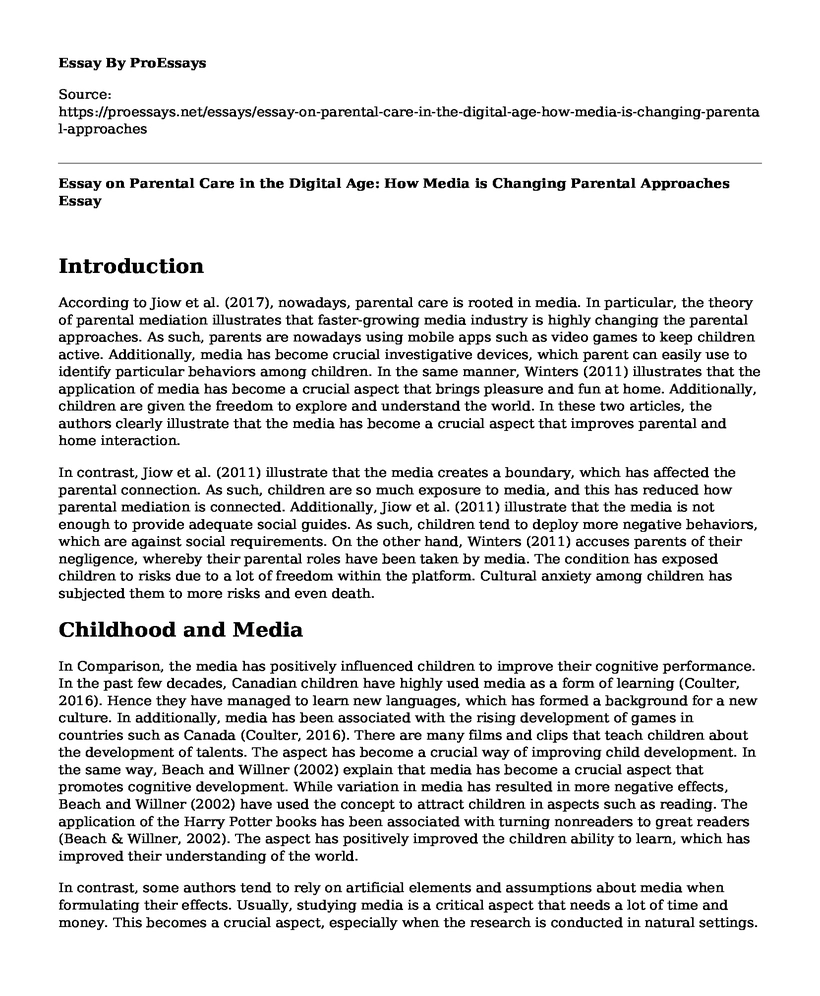Introduction
According to Jiow et al. (2017), nowadays, parental care is rooted in media. In particular, the theory of parental mediation illustrates that faster-growing media industry is highly changing the parental approaches. As such, parents are nowadays using mobile apps such as video games to keep children active. Additionally, media has become crucial investigative devices, which parent can easily use to identify particular behaviors among children. In the same manner, Winters (2011) illustrates that the application of media has become a crucial aspect that brings pleasure and fun at home. Additionally, children are given the freedom to explore and understand the world. In these two articles, the authors clearly illustrate that the media has become a crucial aspect that improves parental and home interaction.
In contrast, Jiow et al. (2011) illustrate that the media creates a boundary, which has affected the parental connection. As such, children are so much exposure to media, and this has reduced how parental mediation is connected. Additionally, Jiow et al. (2011) illustrate that the media is not enough to provide adequate social guides. As such, children tend to deploy more negative behaviors, which are against social requirements. On the other hand, Winters (2011) accuses parents of their negligence, whereby their parental roles have been taken by media. The condition has exposed children to risks due to a lot of freedom within the platform. Cultural anxiety among children has subjected them to more risks and even death.
Childhood and Media
In Comparison, the media has positively influenced children to improve their cognitive performance. In the past few decades, Canadian children have highly used media as a form of learning (Coulter, 2016). Hence they have managed to learn new languages, which has formed a background for a new culture. In additionally, media has been associated with the rising development of games in countries such as Canada (Coulter, 2016). There are many films and clips that teach children about the development of talents. The aspect has become a crucial way of improving child development. In the same way, Beach and Willner (2002) explain that media has become a crucial aspect that promotes cognitive development. While variation in media has resulted in more negative effects, Beach and Willner (2002) have used the concept to attract children in aspects such as reading. The application of the Harry Potter books has been associated with turning nonreaders to great readers (Beach & Willner, 2002). The aspect has positively improved the children ability to learn, which has improved their understanding of the world.
In contrast, some authors tend to rely on artificial elements and assumptions about media when formulating their effects. Usually, studying media is a critical aspect that needs a lot of time and money. This becomes a crucial aspect, especially when the research is conducted in natural settings. Data collection media is another critical aspect that impacts the attainment of the core effect of media. Some studies have been accused of using misapplied methodologies, which have triggered to wrong conclusions. The author illustrates, "that violent people like to watch 'violent films' - but are quite unable to show that the media use has produced that character" (Gauntlett, 1998). For several instances, the power of media has been underestimated. As such, its effects continue to increases as technology development rises. The marginalization range between children continues to increase (Coulter, 2016). More cultural aspect continues to diminish, and children embracing approaches that are socially not accepted.
References
Beach, S. A., & Willner, E. H. (2002). The power of Harry. World Literature Today, 76(1), 102.
Coulter, N. (2016). "Missed opportunity": The oversight of Canadian children's media.
Jiow, H. J., Lim, S. S., & Lin, J. (2017). Level up! Refreshing parental mediation theory for our digital media landscape. Communication Theory, 27(3), 309-328.
Winters, S. F. (2011). Bubble-wrapped children and Safe Books for Boys: The politics of parenting in Harry Potter. Children's Literature, 39(1), 213-233.
Cite this page
Essay on Parental Care in the Digital Age: How Media is Changing Parental Approaches. (2023, May 08). Retrieved from https://proessays.net/essays/essay-on-parental-care-in-the-digital-age-how-media-is-changing-parental-approaches
If you are the original author of this essay and no longer wish to have it published on the ProEssays website, please click below to request its removal:
- How Fast Food Industry Harms Communities
- Five Different Prompts on Main Subjects Covered in the Humanities Paper Example
- Girls Like Girls: Hayley Kiyoko's Dance-Pop Anthem for LGBT Community
- Essay Sample on Malala Yousafzai: Nobel Peace Prize Winner & Children's Rights Activist
- Joint Commission: Accrediting Hospitals for Quality Care & Effective Communication - Essay Sample
- Essay Example on Grow Business with GYB & DYB: Augmenting Business Sustainability
- Smart Diapers - Free Report Example







